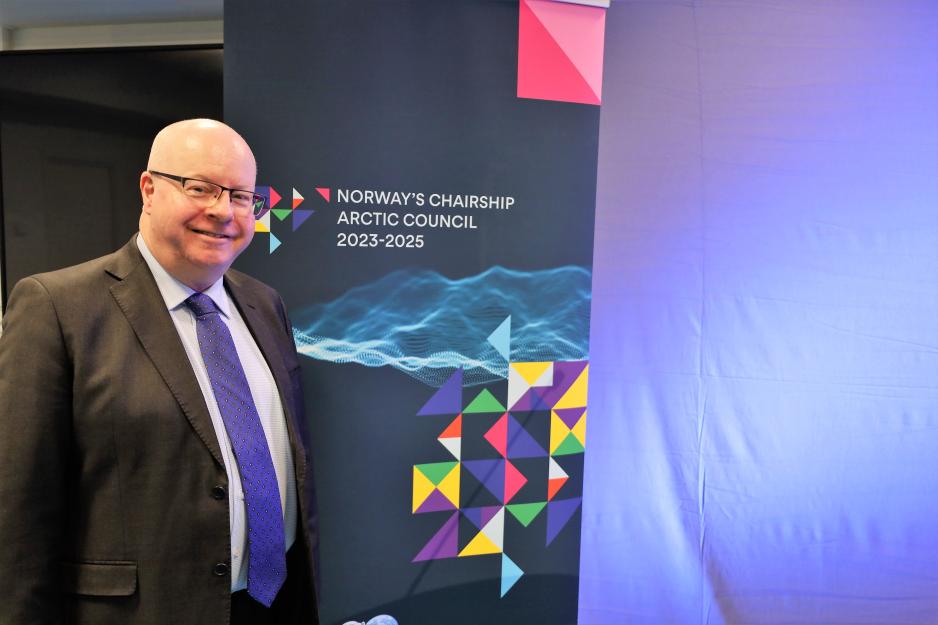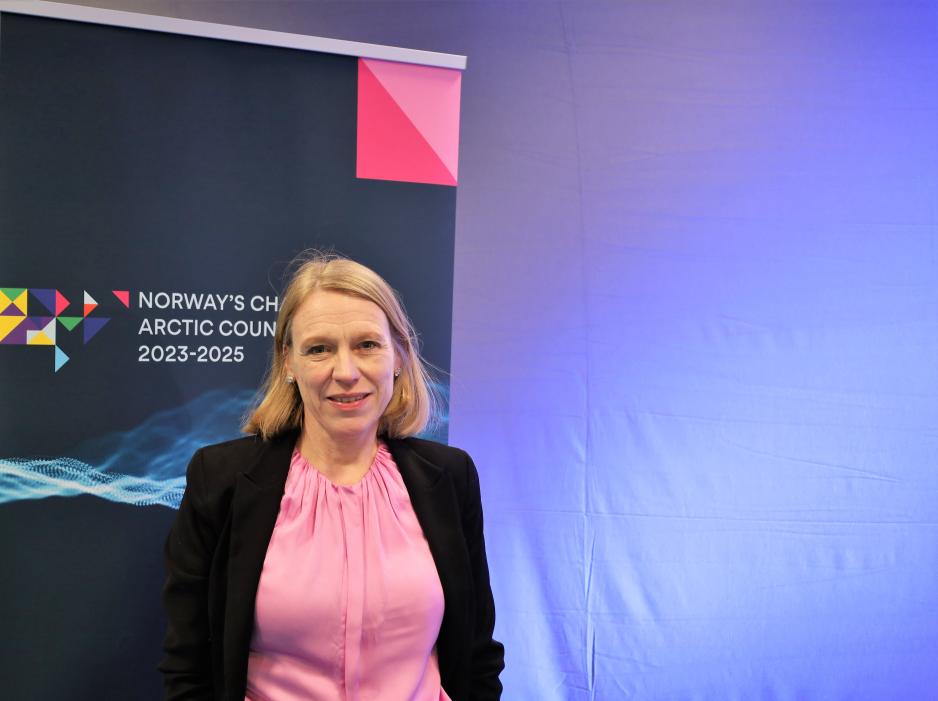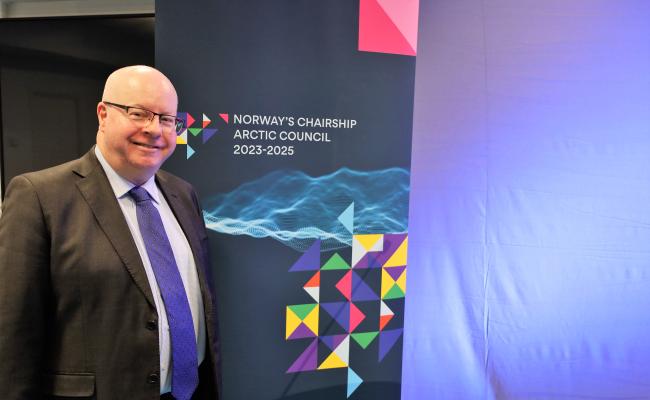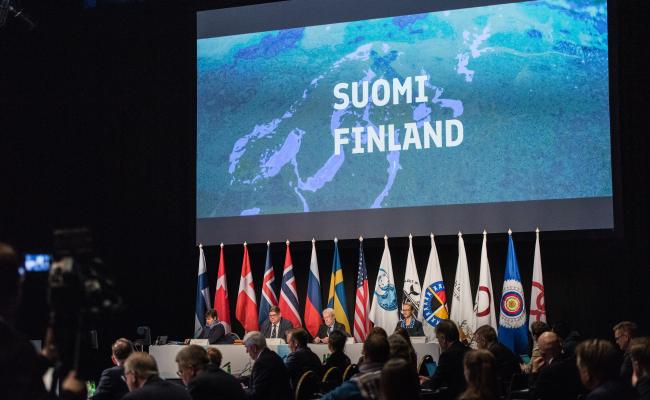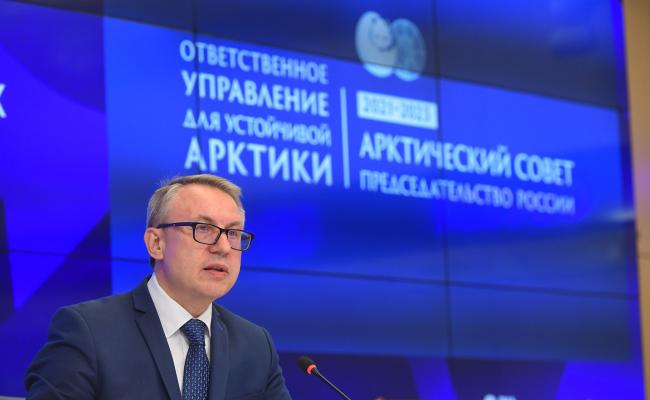"Russia Will Stay in The Arctic Council as Long as it Serves Our Interests"
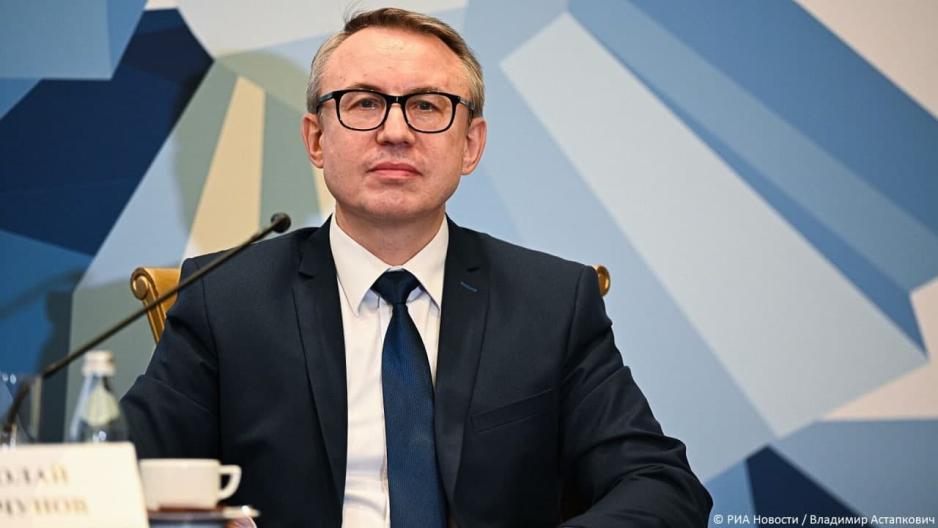
Nikolai Korchunov at Ecumene 2022 in Moscow. (Screenshot from Ecumene 2022)
As Russia transferred the Chair of the Arctic Council to Norway, Russia's Arctic Official Nikolay Korchunov states that the responsibility for the future of a restored council lies in Norway's hands.
Thursday, May 11 was an anticipated day for the Arctic Council members and organizations, as Russia - a neighboring country at war - handed over the Chairship of the Council to Norway, after a year in crisis and standstill.
Compared to previous transitions, the handover of leadership was a quiet affair. The ceremony only took place digitally with a limited number of official participants. But the transition was still considered important because it follows a 26-year tradition of orderly transition and continuity that makes it possible for the Arctic Council to function.
It became clear that the Council was in a very difficult situation quite immediately after the invasion of Ukraine on 24 February last year. The seven western council members - quickly named The Arctic 7 - announced that they were pausing all activity in the Arctic Council until the end of the war.
Concerned
Now, the baton is handed over and Russia's Arctic Official, Nikolay Korchunov, calls the meeting "Business-like". During a press conference following the Arctic Council meeting, he made it clear that the future of an active and restored council now lies in the hands of Norway.
"The future of the council is obviously a concern. But Norway is in a position to keep the organization going and restore the council to its original format," said Korchunov.
Let us see how Norway will manage to find ways to act in the interests of all Arctic countries and parties.
Now that the Chair is in Norway, some of the work can continue - still on a non-political level.
"Let us see how Norway will manage to find ways to act in the interests of all Arctic countries and parties and continue the initiatives and projects that have been initiated by Russia for the past two years," the Russian diplomat stated, adding that Russia is willing to collaborate.
"Today's meeting showed that there is a willingness to keep and maintain the Arctic Council. But whether it will be possible to come back to full-fledged cooperation is difficult to say at the moment."
During a press meeting Thursday, Norwegian Arctic Official Morten Høglund is careful to say too much about Korchunovs hopes for a restored council.
"I am thankful for Korchunovs strong support to the council. We cannot come back to the same level of activity as before the war, that will take time. But I still think that we will be able to start on important work and from there gradually continue," says Høglund.
NATO closing in
Nikolay Korchunov, however, thinks it will be impossible to keep the Arctic Council going forward without interacting with all countries.
"It is not possible because the Arctic Council is first and foremost based on joint initiatives."
Korchunov also expresses concern about NATO closing in on Russia. After Finland and possibly Sweden join NATO, all members except Russia will be NATO members. However, the Russian diplomat stresses that dialogue is the key to keeping the Arctic a region of peace, stability, and international cooperation. A statement that seems ironic, at best, given the brutality of the Ukraine war.
"We need to deepen cooperation across the whole region with a comprehensive approach to regional development, including ecology, climate, science, economics, indigenous peoples, healthcare, contacts between regions, transport, energy issues, and also military topics, even if they are not connected to the Arctic Council. It is important to provide comprehensive security in the region and we are absolutely not interested in escalating the tension in the Arctic. It can all be sorted out by dialogue, which would strengthen the trust. A very important factor in developing cooperation," said Korchunov.
Can do it themselves
But even if Russia's war in Ukraine left the largest Arctic nation out of the Council, the Russian Official said that Russia kept on with its own projects. For example, the implementation of a number of systems to monitor the Nothern Sea Route when it comes to climate and weather conditions.
Also read
"We no longer need data from third parties. We do this on our own now."
HNN has previously covered the topic of Russia's increasing collaboration with non-Arctic nations like China, India, and Latin America, and there has been talk of Russia turning away from the Arctic Council, and establishing new platforms. However, Korchunov denies that this will happen. At least not as long as the council still acts in Russia's interest.
The diplomat makes it clear, though, that Russia reaches wide when it comes to cooperation.
"A country as large as Russia cannot and should not lean on only one format, and be hostage to such a format. Our cooperation in the Arctic could be multilateral, bilateral, and trilateral and this could happen at different levels with the involvement of different geographic players. But there are no intentions to establish an alternative Arctic Council at the moment."
But nothing is certain, as further cooperation within the Arctic Council between the Arctic 7 and Russia is almost non-existent. Even if Russia has no plans yet to leave the Council, Russia comes first.
As of now, it is not possible for Russia to be included.
"It is important to have options to avoid dependence, and everything is possible. Especially if the work of the Arctic Council will not contribute to the implementation and protection of national Russian interests. So far we do not have any plans to exit the Arctic Council, but if the organization becomes useless or our rights are violated, we could consider leaving. We are strictly guided by our national interests and this will come first," stated Korchunov.
Mutual decision
Even if Nikolay Korchunov keeps hinting toward a Norwegian willingness to "restore the Arctic Council", the Norwegian Minister of Foreign Affairs - and fresh Chair of the Arctic Council - says to HNN that all matters concerning Russia will be debated amongst the Arctic 7 before anything is decided.
"This was the first Arctic Council meeting without ministers, and we will consult with the other members about the work ahead. As of now, it is not possible for Russia to be included. Now we can start the work and the conversations with the members about how to proceed. We will focus on projects that do not involve Russia."
Morten Høglund is carefully optimistic about the way that lies ahead, even if it will be necessary to tread lightly.
"We will start immediately within the council to organize the work. It is sensitive and challenging, but possible, even without Foreign Ministers. We are still optimistic and believe we can find a way going forward. We hope to bring some good news very soon," said Høglund.
No declaration
Earlier on Thursday the Arctic Council issued a joint statement from all eight member states, that vaguely describes the work for the next period. This statement carefully marked the re-establishment of the Council and was the first official proof of life since March last year.
The usual Ministerial declaration is not possible, but Høglund reassures that the statement is just as valid as it replaces the declaration.
Norwegian MFA says to HNN that it is too early to know exactly what this will mean.
Both Huitfeldt and Høglund are clear on the fact that no member country wants to expel Russia completely.
"No one has suggested that we should suspend or expel someone. We have to find a way forward that everyone is comfortable with."
All in all and the grave circumstances considered, there is a quiet optimism to be felt when talking to the parties involved. Does that mean that Arctic diplomacy has made its return to the High North?
"Yes, at my level. We were able to do this meeting. That is positive, we will build on that positivity," said Morten Høglund, Senior Arctic Official and Chair of the Arctic Council for the next two years.
The Arctic Council:
The Arctic Council is the leading intergovernmental forum promoting cooperation, coordination, and interaction among the Arctic States, Arctic Indigenous peoples, and other Arctic inhabitants on common Arctic issues, in particular on issues of sustainable development and environmental protection in the Arctic. It was formally established in 1996.
All Arctic Council decisions and statements require the consensus of the eight Arctic States.


